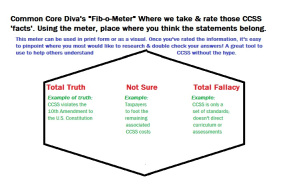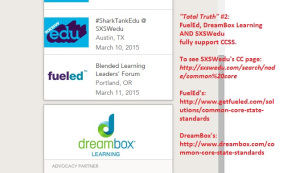Throughout our battle against Common Core aligned education, we’ve heard the rhetoric about College/Career Readiness. We’ve heard about being ‘globally skilled’, etc. Join me today as we filter through the “Getting Smart”/MIcrosoft team effort to making coding career readiness. Time to crank up the Fib-o-Meter!

Briefly, before we find out what’s “Total Truth”, “Total Fallacy”, or “Neutral”, it will be helpful to know what or whom “Getting Smart” is. We know, all too well, MIcrosoft’s foray into CCSS.
“Getting Smart”:
Website: http://gettingsmart.com/ Describes themselves as a community. They blog, they will come and speak to your group AND they have products to offer you. Now, that’s not sounding too bad until you look at WHAT they are promoting AND whom they PROMOTE ‘it’ with!
Here’s what more they have to say about what they do, “We believe the shift to personal digital learning holds promise for improved student achievement in the developed world and access to quality education in the emerging economy–for the first time we have a chance to provide a quality education to every young person on the planet. We’re advocates for better K-12 education as well as early, post-secondary and informal learning opportunities for all students. We attempt to accelerate and improve the shift to digital learning. We cover important events, trends, products, books, and reports. We welcome guest bloggers with something to say. We look for ways that innovation can help reframe historical problems and suggest new solutions.”
Let the “Total Truth” Begin!:
Right off the bat, the “Total Truth” begins to emerge! FIb-o-Meter has the below visual to prove it.

http://presencelearning.com/?s=common+core+standards&submit.x=9&submit.y=11
We know, well, FEE’s ties.
More “Total Truth” in who “Getting Smart” works with in support of CC alignment:
See Fib-o-Meter’s second proof:

The Coding for Career Readiness:
Because this is one of those documents you’ll have to read for yourselves to see the levels of “Total Fallacy” and “Total Truths”, I’m providing the link here:
http://cdno4.gettingsmart.com/wp-content/uploads/2015/01/SmartBundle-MicrosoftFINAL.pdf (be sure you download your own copy of this, copyright laws prohibit me from linking it directly in this article)
We will take the main points and measure their truthfulness or sheer fallacies.
A “Total Truth” in our present day society is this one, ” Young people are growing up in a technology rich, data-driven world and will enter a workforce that depends on tech-skills.”
A “Total Fallacy”, spoken by Mr. Bill Gates himself, “Coding is critical thinking.” Here are the rest of his words, ” “Learning to write programs stretches your mind and helps you to think better, creates a way of thinking about things that I think is helpful in all domains.” Fib-o-Meter’s going with ‘fallacy’ simply due to the fact that knowing what else Mr. Gates believes is great about CC. I don’t see his view on coding via CC, any exception.
Another “Total Fallacy”, this one spoken by Greg Garner (educator and blogger), ” “Learning should always be a process of identifying and then solving unique and interesting problems that don’t yet have answers.” Learning is SO much MORE than this description! I’m an educator and blogger, too and even I can spot the fallacy.
This “Total Fallacy” is truly scary when you consider the message embedded, ” Making coding and computer science available to all students is a social justice issue–there doesn’t have to be a gap between haves and have nots here.” This was spoken by yet another person involved in the publication, educator Adam Renfro. As we’ve seen elsewhere in CCSS aligned classes, social justice is everywhere. Social justice no more belongs in a computer class than it does in a science class!
A “Total Truth”, sad, but true is this: “Coding is collaboration.” Why would Fib-o-Meter rate this a sad truth? Consider all the real life accounts of students we’ve been alerted to about collective grades in class. Consider this other total truth, college professors are finding students are so collaborative minded, individual work is an impossibility.
Where You’ll Will Most Want to Look:
Page 3 begins the ‘social justice’ aspect of computer coding.
Page 5 begins the loss of cursive writing and the transition to keyboarding. Page 6 will be of most interest as they describe cursive as myth/fallacy.
Page 8 will endorse Khan Academy as a great resource. Never mind the “Total Truth” that Gates gave Khan money to align his courses to CCSS. That fact was somehow NOT included in the text. Also in the CS (Computer Science) section, you’ll find the ‘jackpot’ of other CC friendly companies.
Page 12 is where you’ll find the ‘global economic importance’. Following this, on page 13, is where you’ll find the support for learning anywhere, anytime (somehow the “Total Truth” of data mining wasn’t included in the text.)
Considering all the above, I leave you with this closing comment. Read it, let it sink in. Then, re-read it knowing CCSS is at the foundation of all of this. Think about those many students now in the grasp of it.
“The work of teaching coding continues- and is thriving. In 2014, 60 million students tried the Hour of Code. 60 school districts partnered with Code. org, including all 7 of the largest US school districts.”
The statements: “Coding is critical thinking.” and “Learning to write programs stretches your mind and helps you to think better, creates a way of thinking about things that I think is helpful in all domains.” are not total fallacies. Coding does involve higher order thinking skills and planning for contingencies and failure as one writes code. With Gates, we have the “to a hammer everything looks like a nail” problem. Technology/Coding is not the *only* path to critical thinking skills development and stretching ones mind. The same arguments could be made for learning carpentry or a musical instrument. Gates believes technology is a panacea for all that’s wrong with ed. That mantra’s been chanted over and over for the last 20 years but it never proves to be the magic bullet. Kids need to interact with each other and their teachers, not a screen. Coding is a great thing to learn *for kids that want to learn it and have the aptitude for it*, but it’s not something we should be shoving down their throats.
Thank you. I do not disagree that coding can be useful, but I think when filtered through CCSS alignment, it’s harmful. Just like everything else CCSS has harmed. I really like how you are thinking on all your points. Thank you for sharing them.